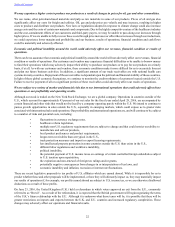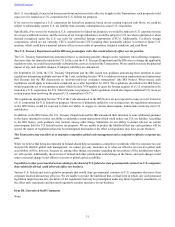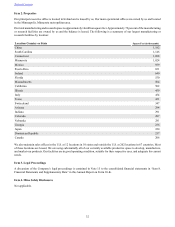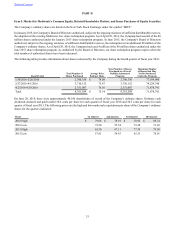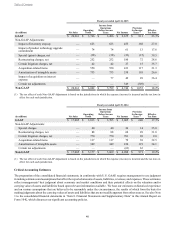Medtronic 2016 Annual Report Download - page 34
Download and view the complete annual report
Please find page 34 of the 2016 Medtronic annual report below. You can navigate through the pages in the report by either clicking on the pages listed below, or by using the keyword search tool below to find specific information within the annual report.
Table of Contents
31
the U.S. Accordingly, if enacted in their present form and retroactively effective to apply to the Transactions, such proposals could
cause us to be treated as a U.S. corporation for U.S. federal tax purposes.
If we were to be treated as a U.S. corporation for federal tax purposes, based on our existing expected cash flows, we could be
subject to substantially greater U.S. tax liability than currently contemplated as a non-U.S. corporation.
Specifically, if we were to be treated as a U.S. corporation for federal tax purposes, we would be subject to U.S. corporate income
tax on our worldwide income, and the income of our foreign subsidiaries would be subject to U.S. tax when repatriated or when
deemed recognized under the U.S. tax rules for controlled foreign corporations (CFC's). Additionally, Covidien's foreign
corporations, which are not currently CFC's, would become CFC's making them potentially subject to current or future U.S.
taxation, which could have a material adverse effect on our results of operations, financial condition, and cash flows.
The U.S. Treasury Department and the IRS may promulgate rules that would adversely affect our tax position.
The U.S. Treasury Department has announced that it is examining possible changes in the regulatory rules affecting companies
that move their tax domicile outside the U.S. In the event the U.S. Treasury Department and the IRS were to change the applicable
regulatory rules, we could face potentially substantial tax costs as a result of the Transactions. We are unable to assess the potential
impact of any such possible changes, if adopted, until they are announced.
On September 22, 2014, the U.S. Treasury Department and the IRS issued new guidance announcing their intention to issue
regulations interpreting multiple sections of the Code, including Section 7874, to address inversion transactions and transactions
that Treasury and the IRS characterize as “post-inversion tax avoidance transactions” (the IRS Notice). When issued, such
regulations would apply to transactions completed on or after September 22, 2014. The regulations described in the IRS Notice
would expand the set of circumstances under which Section 7874 applies to cause the foreign acquirer of a U.S. corporation to be
treated as a U.S. corporation for U.S. federal income tax purposes. Such regulations would also impose additional U.S. taxes on
certain transactions involving the acquired U.S. corporation’s CFC’s.
The regulations interpreting Section 7874 of the Code announced in the IRS Notice are not expected to cause us to be treated as
a U.S. corporation for U.S. federal tax purposes. However, if ultimately upheld by a reviewing court, the regulations announced
in the IRS Notice would be expected to limit our ability to engage in various intercompany transactions involving non-U.S.
subsidiaries.
In addition, in the IRS Notice, the U.S. Treasury Department and the IRS announced their intention to issue additional guidance
in the future intended to restrict our ability to undertake certain transactions which could reduce our U.S. tax liability. According
to the IRS Notice, such guidance may include, among other things, limitations on our ability to deduct interest on certain
intercompany debt for U.S federal income tax purposes. We are unable to predict the likelihood that any such guidance will be
issued, the nature of regulations that may be promulgated thereunder or the effect such guidance may have on our business.
The Transaction may not allow us to maintain competitive global cash management and a competitive effective corporate tax
rate.
While we believe that being incorporated in Ireland should help us maintain a competitive worldwide effective corporate tax rate
and provide flexible global cash management, we cannot give any assurance as to what our effective tax rate nor global cash
accessibility will be, however, because of, among other things, uncertainty regarding the tax policies of the jurisdictions where
we will operate. Additionally, the tax laws of Ireland and other jurisdictions could change in the future, and such changes could
cause a material change in our effective tax rate or global cash accessibility.
Legislative or other governmental action relating to the denial of U.S. federal or state governmental contracts to U.S. companies
that redomicile abroad could adversely affect our business.
Various U.S. federal and state legislative proposals that would deny governmental contracts to U.S. companies that move their
corporate location abroad may affect us. We are unable to predict the likelihood that, or final form in which, any such proposed
legislation might become law, the nature of the regulations that may be promulgated under any future legislative enactments, or
the effect such enactments and increased regulatory scrutiny may have on our business.
Item 1B. Unresolved Staff Comments
None.



